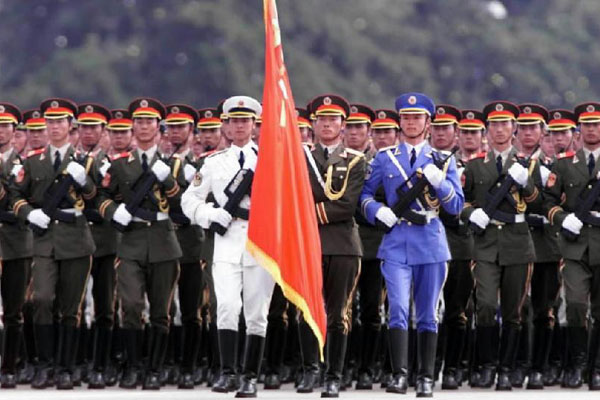Park has good reason to attend Sept 3 parade
Updated: 2015-08-18 07:38
By Wang Junsheng(China Daily)
|
|||||||||
 |
|
The file photo taken in 1999 shows the guard of honor of the three services of the PLA attending a parade to celebrate the 50th anniversary of the founding of the People's Republic of China in Beijing. [Photo/Xinhua] |
The Republic of Korea is likely to announce in a few days whether ROK President Park Geun-hye will attend a grand military parade in Beijing on Sept 3 to observe the 70th anniversary of the victory of Chinese People's War of Resistance Against Japanese Aggression.
Just a week ago, Japan's Kyodo News reported that the United States has, through diplomatic channels, asked Park not to attend the event, although the report was later denied both by Park's spokesman Min Kyung-wook and the US State Department.
Without Washington's diplomatic "intervention", however, attending the event would be the most natural decision of Park, given the improving strategic partnership between the ROK and China. In fact, the two countries have a lot in common when it comes to their history of fighting Japanese aggression before and during World War II.
China was a major overseas base for many Korean exiles who were forced to leave their homeland after Japan occupied the then undivided Korea in 1910.
The Koreans in China even established a government in exile in Shanghai in 1919 with funds raised mostly from the then ruling Kuomintang government. The unyielding forces led by the Communist Party of China, also closely cooperated with numerous Korean people at the later stage of WWII, in their joint efforts to defeat the imperial Japan.
And since Japan's surrender in Aug 15, 1945 was a victory both for the Chinese and Korean people, they should celebrate the occasion together.
China-ROK ties are at their best; even the two heads of state share a special understanding. As one of the few ROK leaders who knows the Chinese language and understands Chinese culture, Park has been pushing for the betterment of bilateral ties since taking office two years ago.
Complementing the gesture, President Xi Jinping paid a visit to the ROK in July 2014, becoming the first Chinese leader to visit the ROK before the Democratic People's Republic of Korea.
More importantly, Park is expected to visit Beijing next month to deepen mutual interests. As the Asia-Pacific's largest and third-largest economy, China and the ROK shoulder great responsibilities - including safeguarding regional peace and maintaining stability. Their shared interests and responsibilities have become more important because of the sensitive regional matters such as the Korean Peninsula nuclear issue and Japan's right-leaning policy.
If Park decides to attend the Sept 3 ceremony in Beijing, it is possible that Japanese Prime Minister Shinzo Abe and DPRK leader Kim Jong-un will consider following her. In particular, Abe must know Japan needs to improve its relations with China and the ROK, and Kim may not want to be left out after skipping the Victory Day parade in Moscow three months ago.
Even if she does not attend the Sept 3 parade, Park's visit to Beijing will be of great importance to regional stability, because if Beijing and Seoul cooperate more closely, Tokyo's neighborhood diplomacy may hardly work. Pyongyang may abandon its rhetoric and act with reason.
Instead of spreading "anti-Japan sentiments" and "flexing its military muscle to intimidate neighbors", China's invitation to Park is aimed at taking Beijing-Seoul ties to a higher level and seeking a breakthrough in their joint pursuit of a peaceful East Asia.
Contrary to what skeptics think, what China wants to say through the upcoming commemorative activities is that Japan should squarely face its brutal past instead of trying to remilitarize itself and indulge in groundless sophistry. Although it is up to Park to decide whether or not to attend the parade in Beijing, hopefully she will not be influenced by the US-ROK alliance and Washington's coercive politics.
The author is an associate professor at the National Institute of International Strategy, Chinese Academy of Social Sciences.
Related Stories
China moves to ensure clean air for military parade 2015-08-17 20:35
Natural that Park attend parade 2015-08-14 08:06
Flower decorations to greet military parade at Tiananmen Square 2015-08-13 10:36
Roads to close for parade rehearsals 2015-08-13 07:51
Today's Top News
Inspectors to cover all of military
Britons embrace 'Super Thursday' elections
Campaign spreads Chinese cooking in the UK
Trump to aim all guns at Hillary Clinton
Labour set to take London after bitter campaign
Labour candidate favourite for London mayor
Fossil footprints bring dinosaurs to life
Buffett optimistic on China's economic transition
Hot Topics
Lunar probe , China growth forecasts, Emission rules get tougher, China seen through 'colored lens', International board,
Editor's Picks

|

|

|

|

|

|







